A guaranteed income program in Boston, Massachusetts, which began in the summer of 2021, resulted in numerous positive outcomes for recipients, highlights a recently published study by the groups that organized the program.
Camp Harbor View and UpTogether, the organizations that dispersed the payments, privately funded the program from a group of 107 donors. Around $750,000 was raised in total, which was given out to 50 families around the Boston area.
The families who were chosen to receive funds didn’t already qualify for social safety net benefits, as the program was designed to help those who were “too rich to be poor and too poor to be rich.” Households qualified for payments for each adult who earned under $70,500, with each payment amounting to $583.
“The public safety net is riddled with restrictions, and the threat of the benefits cliff sometimes means additional income results in less support,” the report noted.
The program netted incredibly positive results — families were able to pay off debt, quit second jobs that they had to have in order to pay bills, and dedicate more money toward college savings accounts for children, the report found.
Families reported a 23 percent decline in psychological distress during the two years that the program existed, from the late summer of 2021 through early fall of 2023. By comparison, families from a control group that didn’t receive the same payments saw an 8 percent increase in distress during that same time.
Forty-five percent of families were also able to save enough money for a household emergency, the report noted; a separate study recently highlighted that more than half of families across the U.S. aren’t financially prepared for an emergency.
The report included testimonies from families that received the payments.
“Receiving $583 each month was a game changer for us,” said Sherene Blake, whose family was part of the program. “I was able to leave my second job to spend time with the kids. My husband had more time to search for a new job and he started one right away. We paid off our credit card bill. We bought a new car for me to get to work. It all added up to reduced stress and more family time for all of us.”
The report provides insights into how Universal Basic Income (UBI) programs could help people who are unable to qualify for existing government benefits but who are still struggling financially to afford basic needs.
For years, advocates have lauded UBI programs as a possible means to help people in difficult financial situations, particularly throughout the COVID-19 pandemic. Many advocates stressed that payments should have been implemented at the start of the pandemic (going beyond the one-time payments Americans received at various points during the economic downturn) and that they should have been permanent.
“Imagine the good feeling when you can pay your rent, or put gas in the car or buy food and after your needs are met, you calmly think about how to move on with life,” author Nicholas Powers wrote for Truthout in November 2020. “Imagine knowing your child will never have to go hungry, or your grandparent without medicine. Imagine another world is possible.”
Jack Delaney, a former disability policy analyst and a member of the Democratic Socialists of America, wrote for Truthout in the summer of 2020 that a nationwide UBI program would be beneficial.
“A permanent, universal and unconditional basic income plan will help balance the inequities of yesterday, today and tomorrow,” Delaney said. “Ensuring workers a guaranteed income from the state is not just a temporary solution to the economic crisis triggered by the pandemic, but rather a long-term measure to counteract aspects of wealth concentration, stagnating wages, job flights overseas and increasing automation down the road.”
But others have warned that, while UBI programs can be helpful, they cannot be the sole or even primary method for ensuring that people’s lives improve. In some cases, they can even perpetuate harmful systems, wrote independent writer Sam Nakayama and Alexander Kolokotronis, founder of the group Student Organization for Democratic Alternatives.
“UBI advocates overlook one of the fundamental questions of power in political economy: Who controls the means of production?” the duo wrote for Truthout in 2017.
Instead of UBI programs, which “hold the potential to actually fit quite well into a neoliberal paradigm,” income inequality can be addressed through “a self-managed socialist job guarantee,” Nakayama and Kolokotronis said.
“With UBI — and the presumably unchanged state and capitalist control of credit — one’s status as a consumer is perpetuated while their status as a worker is tentative and subject to elimination,” the two warned.
Join us in defending the truth before it’s too late
The future of independent journalism is uncertain, and the consequences of losing it are too grave to ignore. We have hours left to raise the $12,0000 still needed to ensure Truthout remains safe, strong, and free. Every dollar raised goes directly toward the costs of producing news you can trust.
Please give what you can — because by supporting us with a tax-deductible donation, you’re not just preserving a source of news, you’re helping to safeguard what’s left of our democracy.
